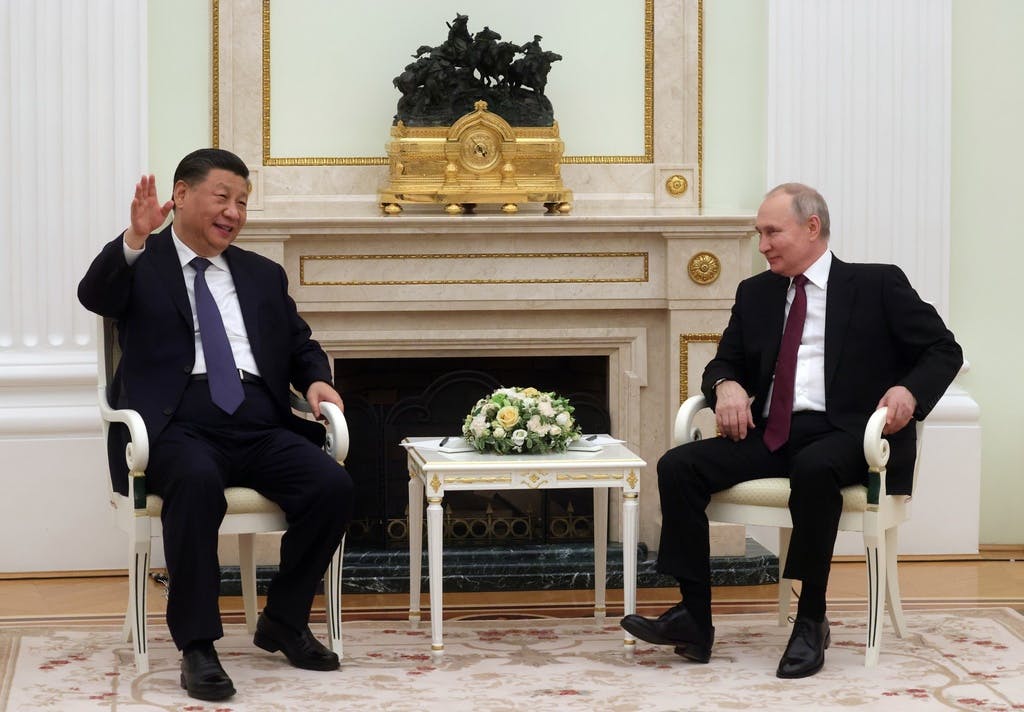As Sino-Russian Relations Tighten, What Will Biden Do To Push Back?
With Xi at Moscow, Washington unveils a new Ukraine aid package.

Can President Biden push back against Chairman Xi’s tightening alliance with Russia’s Vladimir Putin, and will Washington replace bromides about proper global behavior with real-world muscular diplomacy?
“Putin, I always called you a friend,” a beaming Mr. Xi said during a Kremlin photo-op Monday, at the start of his Russia trip. Sino-Russian relations have “reached the highest level in their history and are gaining even more strength,” Mr. Putin retorted. “They surpass Cold War-time military-political alliances in their quality, without limitations or taboos.”
Russia has surpassed Saudi Arabia as Communist China’s largest energy supplier. Further, one of the top items on Mr. Xi’s Moscow agenda is a plan to build a gas pipeline to China from Russia. Even if Beijing does not end up supplying lethal arms to Russia, as Washington has suspected it would, Mr. Xi has become Moscow’s most significant ally in the Ukraine war.
As if to eclipse that alliance, Washington on Monday announced a new $350 million military aid package to Kyiv. The package includes additional ammunition for the American-made High Mobility Artillery Rocket System, as well as artillery rounds, high-speed anti-radiation missiles, and other equipment.
America summarily rejected a Xi-proposed plan for a Ukraine ceasefire. Any plan that doesn’t entail a complete removal of Russian forces from Ukraine “ratifies Russia’s conquest,” Secretary Blinken said.
“The world should not be fooled by any tactical move by Russia, supported by China or any other country, to freeze the war on its own terms,” the secretary of state added. And any peace plan must maintain Ukraine’s territorial integrity “in accordance with the UN charter.”
Further, he said, “that president Xi is traveling to Russia days after the international criminal court issued an arrest warrant for President Putin suggests that China feels no responsibility to hold the Kremlin accountable for the atrocities committed in Ukraine and instead of even condemning them it would rather provide diplomatic cover for Russia to continue to commit those very crimes.”
Beijing summarily dismissed the ICC’s arrest warrant for Mr. Putin on alleged war crimes. The Hague-based court should “respect the immunity of heads of state,” its foreign ministry’s spokesman, Wang Wenbin, said. Communist China, similarly, is unlikely to be impressed by Washington’s calls for it to press Mr. Putin to withdraw forces from Ukraine.
Appealing to UN-based international law and the ICC — which America is no party to — will not weaken the warming Moscow-Beijing alliance. Nor would, as some Republicans advocate, the idea of weakening our support for Ukraine and America’s pushback against Russia in order to concentrate on the Chinese threat.
“China, for all practical purposes, is as much involved politically in Europe’s ongoing war as the U.S.,” a former national security adviser, John Bolton, wrote over the weekend.
Moscow and Beijing are mostly united by their leaders’ determination to undermine America’s global economic, military, and institutional leadership. Yet, Communist China and revanchist Russia are far from the fraternal brothers that Messrs. Xi and Putin present them to be.
Mr. Xi was far from enthusiastic about Russia’s 2014 Crimea annexation and Beijing abstained in UN votes to denounce Russia’s 2022 invasion of Ukraine, a former top state department Asia hand and U.S. Air Force general, David Stilwell, notes.
“Ukraine and other Russian activities present Beijing a great-power dilemma,” General Stilwell tells the Sun. “It has to walk a fine line between showing it, too, has like-minded allies beyond Pakistan and North Korea.” Mr. Putin, he adds, is wary of Beijing’s incursions, through its Belt and Road initiatives, into areas in central Asia that Russia sees as parts of its sphere of influence.
“The closer these two traditional geostrategic adversaries are pushed together, the more visible these fissures will become,” General Stilwell says, referring to Moscow and Beijing. To take advantage of these fissures, he says, America should send diplomats to places like Tajikistan, Kyrgyzstan, and Kazakhstan, and “offer them an alternative to Moscow and Beijing.”
China, he adds, is increasingly worried about the Taliban takeover of its neighbor, Afghanistan, and is dispatching private security companies there. Will Beijing increase its influence there?
Either way, Mr. Xi is happy to enter any area, like Afghanistan, that America has left behind. “If the U.S. deprioritizes or abandons a geographic area, it is simply an invitation to Beijing (and Moscow) to enter and fill the vacuum we create,” Mr. Bolton wrote.
The recent agreement to renew diplomatic relations between Tehran and Riyadh under Beijing’s auspices, Mr. Bolton added, must “shatter any illusions that our struggle with China is anything less than global.”
The cunning Henry Kissinger identified the fissures behind a seemingly united Soviet-led front, paving the way for President Nixon’s 1972 Beijing trip. Rather than relying on the UN charter and ICC indictments, America should play hardball with the entire globe in order to weaken all Chinese-led alliances.

